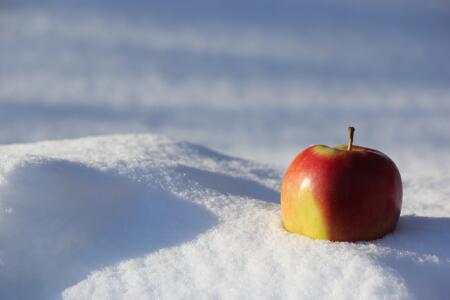
Sports Nutrition Tip for the Month: Eating for the Cold Weather
By Katina Sayers
 The days are shorter and the temperatures are dropping. Despite the change in seasons, runners are resilient and impervious to the cold weather and continue to train outdoors. Training in cold weather expends more energy which translates into needing about 5-15% more calories per hour than if training during the heat of the summer. Taking into consideration weight of clothing, regulating body temperature, and navigating challenging terrain, runners should eat with this in mind and never let their “tank” run low in these conditions.
The days are shorter and the temperatures are dropping. Despite the change in seasons, runners are resilient and impervious to the cold weather and continue to train outdoors. Training in cold weather expends more energy which translates into needing about 5-15% more calories per hour than if training during the heat of the summer. Taking into consideration weight of clothing, regulating body temperature, and navigating challenging terrain, runners should eat with this in mind and never let their “tank” run low in these conditions.
There’s an on-going debate whether runners should eat those additional calories in the form of carbohydrates or healthy fats. Because I follow the concept of bioindividuality (which in simple terms means “what works for one person won’t work for another person”), runners need to examine their diets and decide which fuel source tends to supply them with steady energy to accomplish their performance goals.
Cold weather fueling recommendations:
- Hydrating in the cold weather is just as important as in the summer, so find fluids that work in cold conditions. The biggest challenge I deal with every winter is freezing water bottles. Insulated water bottles tend to slow down the rate of bottle freeze, but inevitably it still happens on longer workout days. Pre-heating drinks help, but sometimes the cap freezes when exposed to the elements. If possible, keep bottles close to the body and covered with a layer of clothing. By doing so, the body’s heat will slow the rate of freezing. There’s an old wives tale that says putting a little bit of alcohol into your bottle can prevent freeze-up. After a personal experiment which included several attempts of different quantities of alcohol, let’s just say that it affected my performance and coordination. Another well-intended and not well thought out experiment was making the decision to not carry a water bottle and choosing to eat snow instead. It takes about 5 cups of snow to equal 1 cup of water. Not only did this experiment coat my face and gloves in snow, but it also rapidly chilled my core. Again, not recommended.
- Find foods that work in the cold weather. Similar to finding fluids that work in the cold, sports nutrition products can also freeze. Try putting bars and gel blocks into the ‘fridge or freezer to replicate the outdoor temperatures and check them hourly. Use this personal experiment to gauge how long the product can be easily consumed during a long run. Another personal story that started out with good intentions which led to a chipped tooth and trip to the dentist’s seat entailed biting into sports bar which had frozen in my back pocket. Not realizing that the bar had frozen, I bit into the bar and attempted to break off a piece. My dentist gained more from that experience than I did.
- Keep a steady rate of calories flowing in. Plan a snack or break for mini-meals at regular intervals, especially for longer training days. Aim to consume 400-500 calories every 2 hours.
Source: Endurance Sports Nutrition
Latest News
Upcoming Events
Tully Free Library Turkey Trot 5K Run/Walk
All Day | 5872 Meeting House Rd, Tully, NY 13159
The Tully Free Library Turkey Trot 5K Run/Walk is held every year on Thanksgiving Day mornin…
Learn More ›Live Like Liam
All Day | Jamesville-DeWitt High School, 6845 Edinger Dr, De Witt, NY 13214
"Live Like Liam"... Celebrate life and community as you help fund important initiatives in L…
Learn More ›
Connect With Us
see the latest from Fleet Feet Syracuse